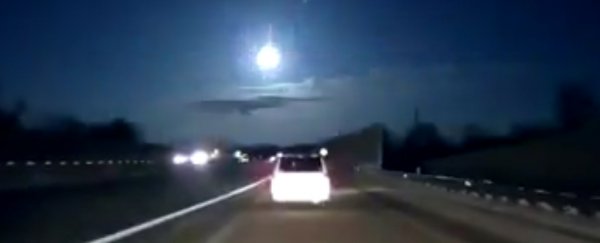A fireball ripped through the sky over southeast Michigan at around 8:10pm Tuesday evening, a display that set social media ablaze with videos and speculation.
Detroit's National Weather Service (NWS) reported via Twitter that the rumble of the exploding space rock was powerful enough to cause a 2.0 earthquake. It was a statement they were quickly prompted to correct.
Nearly 400 individuals reported watching a light streak across the night sky yesterday – a scene captured by dozens of cameras from pretty much every angle.
I got lucky tonight! @wwmtnews pic.twitter.com/yD2NWonUv6
— ZL (@z_lawler) January 17, 2018
The flash itself was reportedly bright enough to have been seen from neighbouring states and was reported to have produced a thunder-like boom.
Sometime later NWS Detroit tweeted a few fun facts about the phenomenon – it was thought to be a meteor roughly 2 metres (6 feet) in diameter travelling about 45,000 kilometres (28,000 miles) per hour.
This kind of meteor was also a bolide; a large rock that explodes in the air with a bright flash long before it can hit the ground.
That explosion was heard – and felt – by a number of people, prompting the NWS to Tweet the following:
USGS confirms meteor occurred around 810pm, causing a magnitude 2.0 earthquake: https://t.co/ikp8BG4ITp #miwx
— NWS Detroit (@NWSDetroit) January 17, 2018
Such a shaking is barely enough to jingle the cutlery in your drawer, but does it qualify as an earthquake?
Some vigilant geological enthusiasts didn't think so, and quickly (if not necessarily congenially) pointed out the difference between the rubbing of tectonic plates and a measurement on a seismograph.
WRONG. The meteor did NOT cause an earthquake. It registered on the Richter scale as a measurment that would be equal to a 2.0 event.
— Thomas McLaughlin (@DangerKittyTom) January 17, 2018
The service agreed and clarified that the explosion generated an atmospheric pressure wave that collided with the ground, setting the seismograph needles wiggling.
On the scale of bolides, the explosion is barely a pop.
In 2013, a meteor over the Russian city of Chelyabinsk shattered windows as it broke apart at an altitude of about 27 kilometres (17 miles), with estimates that it was 30 times brighter than the Sun and as powerful as 30 Hiroshima bombs.
The USGS claimed that made the ground tremble at a whopping 4.2 on the Richter Scale.
Then there was the famous 1908 Tunguska event, which resulted in an airblast that flattened a Russian forest and was thought to push the Richter scale up to a solid 5.0.
For a long time scientists weren't fully clued in on why some asteroids explode with such violence as they power through the air.
Last year, researchers suggested the difference in pressure between the compressed air in front of the object and the relative vacuum behind causes air to squeeze into its pores.
This channelling of air pressure inside the meteor could be what ultimately causes some rocks to gradually weaken and then suddenly rupture.
Not all space rocks go in the same way, of course. Some are quieter than others; while definitely earthshaking, the Michigan fireball wasn't unusual.
"This particular one is probably a once-a-year, maybe three-times-a-year type of fireball," operations manager for the American Meteor Society Mike Hankey told the New York Times.
Not to suck the fun out of it, of course. For Michigan's late night commuters, this unscheduled fireworks display was still an amazing sight to behold.
